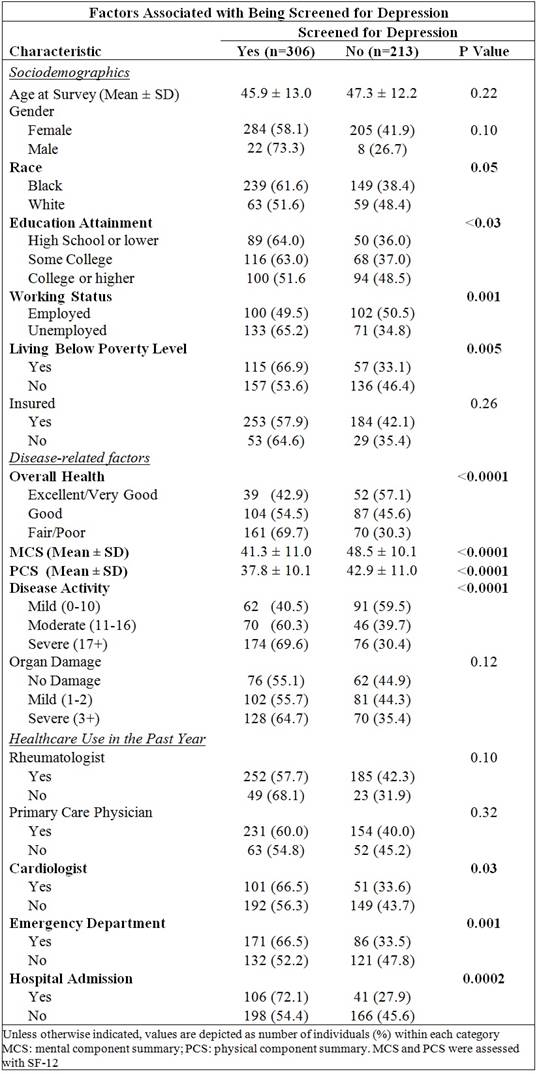Session Information
Session Type: Abstract Submissions (ACR)
Background/Purpose: Depression can be found in 20-60% of SLE patients and has substantial impact on quality of life, disease outcomes and health care costs. Although pathways are not fully unraveled, immune and disease-related factors have been found associated with depression in SLE. In the general population, racial minorities, women and people from lower socioeconomic status (SES) have increased risk. Thus, SLE patients of minority groups and SLE women carry additional factors to those directly associated with the disease. Depression screening, one of the preventive care services recommended by the United States Preventive Services Task Force (USPSTF) for adults receiving care in clinical practices, has shown to improve outcomes when it is combined with further treatment. However, no study has examined the provision of depression screening in adult SLE patients. We assessed depression screening and the contributing factors associated with being screening in a high-risk SLE cohort from the Southern US.
Methods: We used a cross-sectional design to examine Wave 2 data (2012-2013) from the Georgians Organized Against Lupus Cohort (GOAL). GOAL participants are validated SLE patients primarily derived from the Georgia Lupus Registry, a population-based lupus registry established in metropolitan Atlanta, GA, US. GOAL includes patients of the full sociodemographic spectrum and collects self-reported measures on health care utilization and health conditions. We assessed the proportion of SLE patients screened for depression in the past year using two screening questions recommended by the USPSTF. The prevalence of depression was assessed using the Hospital Anxiety and Depression Scale (HADS). We used Chi2 tests and Student t-test to examine demographic and disease factors associated with being screened for depression.
Results: Among 519 respondents of the ongoing Wave 2 GOAL survey, 163 (31%) had depression and 113 (22%) had both depression and anxiety. Only 59% of patients indicated that they were screened for depression. Among 213 patients not screened, 18% reported symptoms compatible with depression.
Conclusion: We found important gaps in the quality of screening for depression among SLE patients. Over 40% were not screened and among them, 18% had depression. Thus, a substantial number of SLE patients missed the opportunity of early diagnosis and treatment. Patients from disadvantaged groups, such as Blacks, unemployed or of lower education, as well as those with worse disease health status were more likely to be screened. However, even within those high-risk groups, at least 30% of cases were not screened. Depression screening was more frequent in patients who visited a cardiologist, the emergency department or were hospitalized in the past year. This study underscores the need for better performances in screening for depression services provided to SLE patients.
Disclosure:
C. Drenkard,
GlaxoSmithKline,
2;
C. M. Dunlop-Thomas,
None;
G. Bao,
None;
S. S. Lim,
GlaxoSmithKline,
2.
« Back to 2013 ACR/ARHP Annual Meeting
ACR Meeting Abstracts - https://acrabstracts.org/abstract/depression-screening-in-patients-with-systemic-lupus-erythematosus-from-the-southeastern-united-states-missing-opportunities-for-early-diagnosis-and-treatment/

